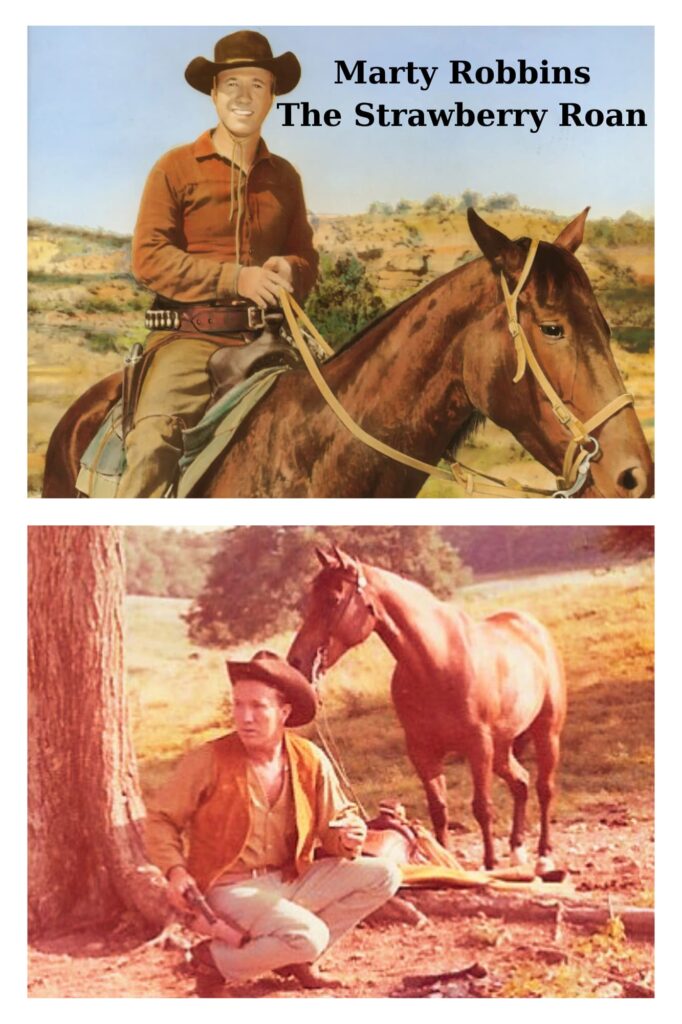
The Enduring Spirit of a Wild Horse: A Cowboy’s Ode to Freedom and Friendship
Ah, the open range. For those of us who remember a time when the world moved a little slower, when stories were told around crackling campfires and the wind whispered tales through the tall grass, there’s a particular resonance to the melodies that capture that spirit. And few artists embodied the essence of the American West quite like Marty Robbins. Today, we’re going to saddle up and take a journey back to a classic that, while perhaps not a chart-topper in the way pop hits were, held an undeniable place in the hearts of country and western enthusiasts: “The Strawberry Roan.”
Unlike some of Robbins’s later smash hits like “El Paso” or “Don’t Worry,” “The Strawberry Roan” didn’t storm the Billboard charts with a definitive, single-digit peak. This wasn’t a radio pop sensation of its time, but rather a beloved track from his extensive and celebrated discography, specifically appearing on his 1959 album, “Gunfighter Ballads and Trail Songs.” This album, a cornerstone of Western music, itself reached an impressive No. 6 on the Billboard Top Country Albums chart. “The Strawberry Roan”, therefore, gained its prominence not from a singular chart explosion, but from its inclusion on an iconic album that resonated deeply with a generation captivated by cowboy lore and the romanticism of the frontier. It was a testament to the album’s enduring quality and Robbins’s storytelling prowess that tracks like this became ingrained in the collective memory of his fans, often discovered and cherished through repeated listens to the entire LP.
The story behind “The Strawberry Roan” is as timeless as the Western landscape itself. It’s a classic cowboy ballad, an age-old narrative of man versus wild, of challenge and respect. The song tells the tale of a determined cowboy, a “top hand” in his own right, who boasts that he can ride any horse. His pride, however, is put to the ultimate test by the eponymous Strawberry Roan, a wild, untamed horse of legendary bucking power. The roan, described with vivid imagery – “built like a rock, and he bucked with a jar,” “his eyes were like coals, and his mane like a flame” – becomes a symbol of unconquerable spirit, a force of nature that defies human mastery. The cowboy’s repeated attempts to break the horse are met with spectacular failures, each one described with a touch of good-natured humor and a nod to the horse’s sheer power. He’s thrown clear, landing “like a rag on a tree,” and finds himself “eatin’ dust.”
But beyond the thrilling rodeo spectacle, the true meaning of “The Strawberry Roan” lies in the evolving relationship between the cowboy and the horse. It’s not a story of brute force conquest, but one of earned respect and ultimately, a unique bond. The cowboy, despite his initial boastfulness and repeated failures, never resorts to cruelty. He comes to admire the roan’s indomitable will, recognizing its inherent wildness not as an obstacle to be crushed, but as a quality to be respected. In the end, there’s a tacit understanding, a mutual acknowledgment of strength. The cowboy doesn’t “break” the roan in the conventional sense; rather, he comes to terms with its spirit. It’s a poignant reflection on humility and the understanding that some things are meant to be free. The song beautifully captures the essence of the cowboy ethic, where a deep connection to the land and its creatures often transcended mere utility. It speaks to a profound respect for the wild, an appreciation for the untamed beauty of nature, and the quiet dignity found in acknowledging limitations.
For many of us who grew up with Marty Robbins’s voice as a constant companion, “The Strawberry Roan” wasn’t just a song; it was a vignette, a vivid painting of a bygone era. It evoked images of dusty plains, wide-open skies, and the enduring spirit of those who carved out a life on the frontier. Robbins’s delivery, with his smooth, resonant baritone, lent an authenticity to the narrative that made you feel as if you were right there in the corral, witnessing the epic struggle yourself. It was a gentle reminder of simpler times, of courage in the face of challenge, and of the unique connection that can form between man and beast when respect is the foundation. It’s a song that continues to buck and kick its way into our hearts, reminding us of the enduring power of a good story, a memorable melody, and the timeless appeal of the American cowboy.